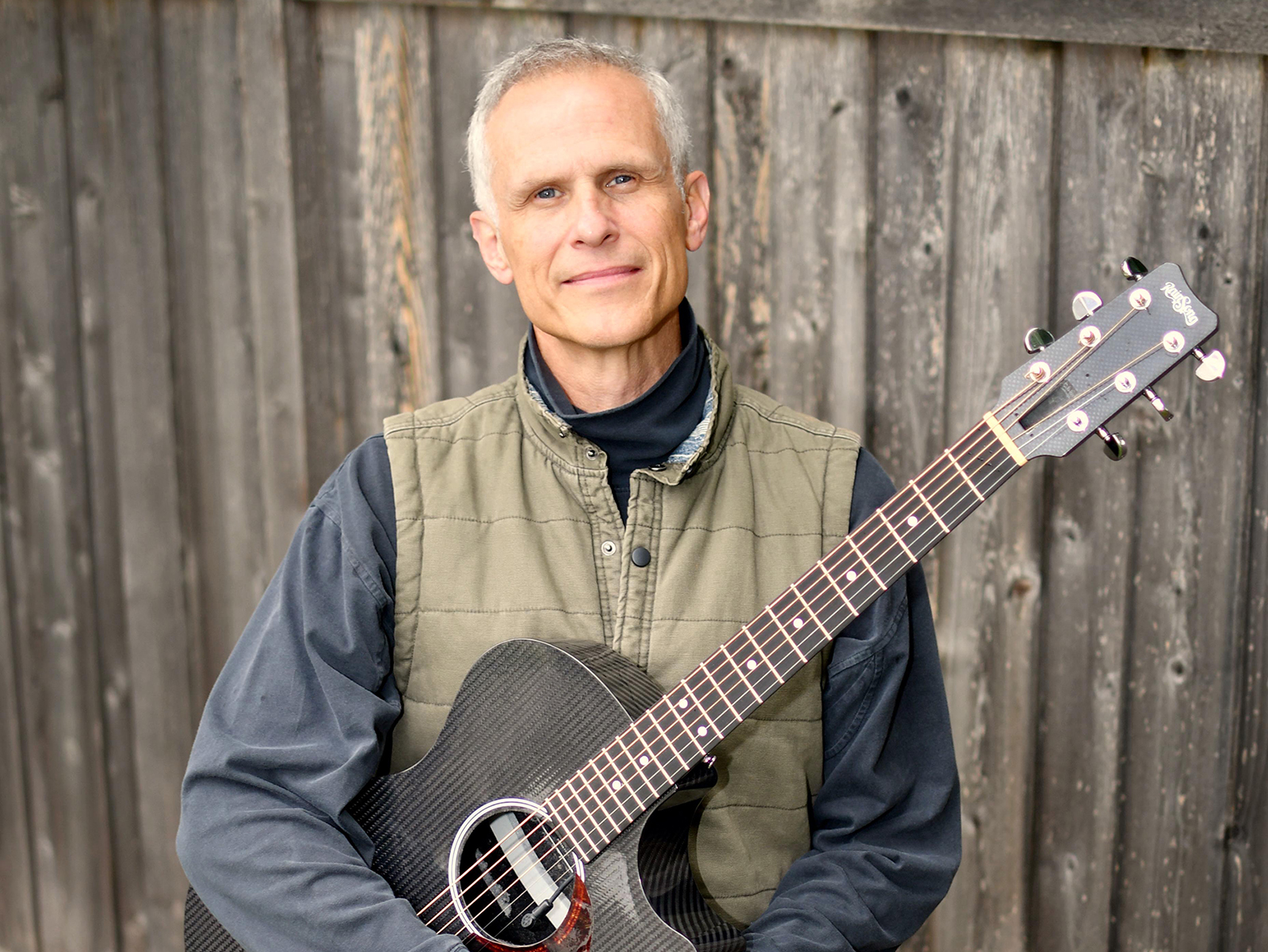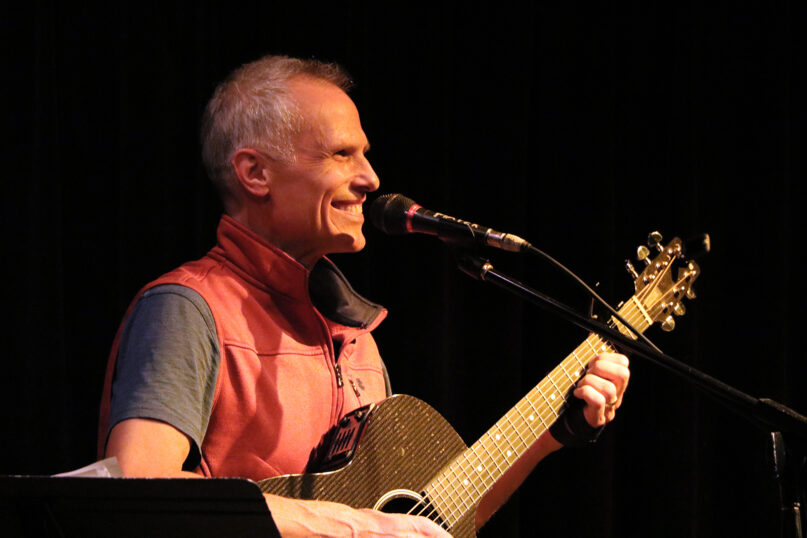
RACINE, Wis. (RNS) — In the mid-1990s, Peter Mayer, a former Jesuit novitiate turned singer-songwriter, quit his job as a music director at St. Gregory the Great Catholic Church near St. Paul, Minnesota, and set on the road to making a living as a musician.
Thirty years later, he’s still at it. These days, he’s mostly playing in churches, because even though he no longer identifies as a Christian, houses of worship are the one place where people gather to sing about truth and the meaning of life.
“I’ve often thought that really, all I write is church songs,” Mayer said in a recent phone interview. “That’s the place where people seem to recognize what I’m doing.”
Mayer, now a Unitarian-Universalist whose tunes have been covered by artists like Kathy Mattea and David Wilcox, is best known for his songs “Holy Now” and “Blue Boat Home,” a hymn about the Earth that was recently turned into a children’s picture book released by a Unitarian publisher. He’s also appreciated for his joyous performance style, dry sense of humor and his belief that the universe is filled with wonder. He writes songs for folks who might doubt organized religion but have not lost faith.
At a mid-April benefit concert at the Siena Retreat Center in Racine, Wisconsin, more than 200 listeners, many of them fans, gathered to hear songs inspired by Mayer’s experience growing up in the Catholic Church, the summer solstice, Dr. Seuss, the late Buddhist teacher Thích Nhất Hạnh and even a trip to the Greyhound park with his parents as a kid.
“It’s not a real rabbit,” warns the protagonist of “Greyhounds,” a sing-along inspired by that trip to the racetrack. “So, we have been running and running around in a meaningless race.”
As a young man, Mayer got a degree in theology and hoped to become a Jesuit. But after a few years, he realized the priesthood was not for him—“mostly because of the celibacy,” he said.
Growing up in church, Mayer learned that while certain places and objects were holy, others were not, and that miracles were something that happened in the past. Later, as he recounts in “Holy Now,” he began to see miracles everywhere — from the cosmos above to birdsong in the morning.
“I think life can be very difficult for a lot of people,” said Mayer, who lives in Stillwater, Minnesota. “But if you’re able to stop and think about some of these things, you can also feel the magic of it all.”
Lea Morris, a songwriter and composer who lives in Germany, first heard Mayer’s music when she opened for him at a concert more than a decade ago. She has been a fan ever since, often covering his songs, and appreciates his lyrics and his musicianship. She said his songs have summed up “much of my searching and discovery.”
“He really has everything a folk lover and deep thinker wants in a troubadour,” she said in an email, calling Mayer’s lyrics “intellectual and spiritual, scientific and mystical.”
“Blue Boat Home,” a popular hymn in Unitarian circles that pairs with the well-known tune “Hyfrydol” — also used in hymns like Charles Wesley’s “Come Thou Long Expected Jesus” — showcases Mayer’s sense of wonder about the universe. The song, often sung by choirs and church congregations, has been covered by classical and folk singers alike.
“It’s hard to miss if you are in the Unitarian-Universalist environment at all. It’s just so popular and so beloved,” said Mary Benard, editorial director of Skinner House Books, a Unitarian publisher that last month turned the song into a children’s picture book. Illustrated by Sue Todd, the book draws from Mayer’s lyrics about the Earth as a ship sailing through the heavens to life.
“It’s just such a beautiful metaphor, and it works for when we’re talking about the environment. It works for when we’re talking about social justice,” Benard said. “It works for when we’re talking about being in the right relationship with each other. It just works on so many levels.”
The Rev. Jason Okrzynski of United Protestant Church in Grayslake, Illinois, a longtime fan, was in the crowd for Mayer’s April concert along with his kids, who grew up listening to the singer’s music.
Okrzynski first heard Mayer’s music while he was a student at Concordia College in Moorhead, Minnesota, and then at a Lutheran church camp, where the summer staff were all fans of Mayer’s 1997 album, “Bountiful.” They were especially fans of a song in which the Buddha and other religious figures all head to Jerusalem for a “Birthday Party” thrown for Jesus.
He later took guitar lessons from Mayer and has used some of his songs during church services. Okrzynski said the singer has a way of finding deep meaning and gratitude, even in the smaller things in life.

Peter Mayer performing. (Courtesy photo)
“I think he makes me a better Christian,” Okrzynski said. “His songs really do speak to my soul in a significant way.”
Michael Graham, pastor of Gilford Community Church in Gilford, New Hampshire, which hosted Mayer for six or seven concerts over the years, sums up Mayer’s music this way: “He can write a song that is as deep as you could have possibly imagined, and then yet share a song that might make children laugh.”
During the Wisconsin concert, Mayer, who admits he’s a “terrible businessman,” pointed audience members to his website at petermayer.net, where they could order his music or copies of the “Blue Boat Home” book. He also warned them to be careful to find the right Peter Mayer — the Minnesota-based folk singer — and not the guitarist Peter Mayer, a Lutheran songwriter who spent years touring with Jimmy Buffett. (Mayer’s website includes a link to the Lutheran Peter Mayer, in case folks went to the wrong site.)
One of the high points of the concert in Racine came when Mayer sang “Dorothy’s Pie” — a crowd pleaser that pays tribute to the singer’s parents and tells a story from their marriage, which lasted seven decades.
In the song, Mayer’s dad, Vern, is saddened to learn that his wife, Dorothy, has made a pie for the church bake sale — and contrives to be the first in line to buy the pie when the sale begins.
“Maybe you’ve heard of the old aphorism, ‘Love made a fool out of me,’” Mayer sang. “Well, love made Vern one in just 40 minutes, at 425 degrees.”
Mayer credited his mother, now 90, with another gift — a sense of humor. Many of his songs poke fun at the foibles of human existence or the lighter side of life, such as “Driving with my Knee,” about a multi-tasking driver, or “Jama Day,” a song about his wife’s love for spending a day in pajamas.
While he likes to ponder the deep questions of life, “who wants to sit through two hours of that?”
“Laughter is just such good medicine,” Mayer said. “Oh, my God, especially nowadays.”
His concert in Wisconsin ended with a spirited version of “Where Is the Light,” a spiritual singalong inspired by the winter solstice, and “This Little Light of Mine.” Mayer, still a church choir director at heart, urged the audience to sing like Southern Baptists.
“What’s better than joy,” he said. “Even more than meaning, we just want joy.”
